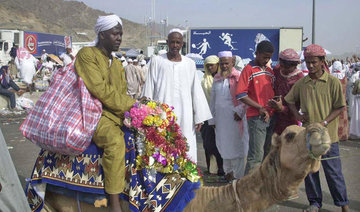LONDON: The maps of Makkah and Mount Arafat are wearing thin at El-Sawy Travel, a Hajj and Umrah tourism agency in St. John’s Wood, northwest London.
Faded finger marks show where owner Hamdy El-Sawy has traced the journeys made by hundreds of British Muslims he has taken on the sacred pilgrimages to Saudi Arabia over the past four decades.
“I enjoy serving them— they are the guests of God,” said El-Sawy, rubbing eyes that are rheumy with age.
When El-Sawy established his business in 1978, he was the only Hajj group tour operator in the UK. Today, scores of similar businesses take more than 25,000 British citizens and residents to Saudi Arabia each year to fulfil the fifth pillar of Islam.
Times have changed since El-Sawy first visited Saudi Arabia in 1974. Traveling from his native Egypt to undertake the Umrah, he journeyed by sea. “I think it took 40 hours,” he recalled with a laugh.
After moving to London and setting up a translation company in the late 1970s, El-Sawy began organizing weekend bus trips across the country for London’s Muslim community.
“One day we were coming back from Manchester when somebody asked, ‘When is the big trip?’ I thought maybe he wanted to go to the Lake District or Wales. So I said, ‘where would you like to go?’ He said: ‘The Hajj’”
The pilgrimage to Makkah is one of the five pillars of Islam, with all able-bodied Muslims required to visit the holy site at least once.
El-Sawy led the first British Hajj group to Makkah in 1981, taking 47 Muslims from all different origins and ethnicities on the sacred journey. The “very simple” town of Makkah where El-Sawy landed with his first group of pilgrims has long since given way to a global hub with infrastructure capable of managing the annual arrival of 6.5 million faithful from across the globe each year.
“There has been a lot of improvement,” El-Sawy said.
Other tour operators agreed. Abu Tahera, who has worked with with Birmingham-based Premier Hajj Tours for a decade, said that communication between authorities in the Kingdom and the UK has improved markedly.
“I’ve been doing this for about ten years, and there have been a lot of changes in terms of logistics, and in terms of the way the [Saudi] embassy deals with the issuance of visas…. It’s getting better and easier,” he said.
Another change has been in the cost of the Hajj. The first year he led a group on the Hajj, El-Sawy charged pilgrims £325 ($451). Today, Hajj tours purchased through his business cost between £4,000 and £6,500.
Nevertheless, Britain’s Hajj tourism industry is thriving despite the appreciable price tag on packages. On average, tours cost £5,000, with super luxury itineraries selling for £13,000 and more, according to Rashid Mogradia, CEO of the Council for British Hajjis, a UK national charity which promotes the welfare of British pilgrims. According to statistics provided by the City of London, British Muslims spend £90 million on pilgrimages each year.
Despite the considerable sum, more and more British Muslims are investing in the journey. “The UK market is very strong and growing.” Mogradia told Arab News. “The more reputable and licensed operators are showing an increase in their bookings.”
Between 2016 and 2017, the number of British residents embarking on the Hajj jumped from 19,000 to more than 25,000, while the number taking the Umrah soared from 75,000 to 100,000 over the same one-year period.
Mogradia said that the sharp increase is due in part to the Islamic calendar, which changes each year and currently sees Hajj fall during the summer months. “People are off work, it’s the holiday season and its easier for them to undertake the pilgrimage.”
However, other reasons may also be behind the dramatic increase in British pilgrims: “The fact that in the time where Muslims are under constant attack you have the prevalence of Islamophobia within the UK and around the world— the Hajj is seen as a spiritual rejuvenation. People go and seek solace through their faith,” said Mogradia.
The average age of UK pilgrims is decreasing, several operators said, as British families today bring young children on the Hajj. But there is also a cross-generational mix not seen previously as middle-aged Muslims take older parents along with them.
The younger generation of pilgrims demand top quality Hajj services. “People are doing research before going,” said Tamim Ahmed, managing director of the family-owned Ahmed Travel, based in East London. “Ten years ago when I first started in the market, people didn’t do much research: they went to their local mosque and [selected] which group was easiest to join,” he said.
“People look for the best hotels: it’s about quality to make sure their Hajj is done properly,” said Ahmed, whose company took more than 350 British muslims on the pilgrimage. “People are shopping around for packages,” he explained.













